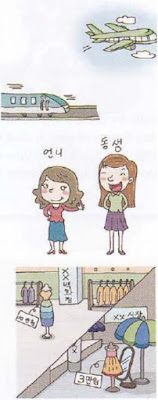 비행기가 기차보다 빨라요.
비행기가 기차보다 빨라요.
(= 기차보다 비행기가 빨라요.)
Airplanes are faster than trains.
동생이 언니보다 더 커요.
(= 언니보다 동생이 더 커요.)
My little sister is bigger than my elder sister.
백화점이 시장보다 더 비싸요.
(= 시장보다 백화점이 더 비싸요.)
The department store is more expensive than the market.
Usage:
보다 indicates that the word preceding it is the standard from which a comparison will be made. It corresponds to ‘more … than’ or ‘-er than’ in English. Though 보다 is added to a noun to form ‘N 이/가 N보다 -하다’. the order of the subject and noun with 보다 added can be reversed with no change in meaning. Also, while the adverbs 더 and 덜 are generally used together with 보다 they can be omitted.
 Conversation:
Conversation:A: 봄을 좋아해요, 여름을 좋아해요? Do you like spring or summer?
B: 여름보다 봄을 더 좋아해요. I like spring more than summer.
A: 댄 씨, 토요일이 바빠요. 일요일이 바빠요?
Dane, are you busy on Saturday or Sunday?
B: 저는 일요일에 교회에 가요. 그래서 일요일이 더 바빠요.
I go to church on Sunday. So I’m busier on Sunday.
A: 제주도하고 서울하고 어디가 더 따뜻해요?
Which is warmer, Jeju Island or Seoul?
B: 제주도가 더 따뜻해요.
Jeju Island is warmer.
Click below:
N이/가
N은/는
N을/를
N와/과, N(이)랑, N하고
N의
N에 ①
N에 ②
N에서
N에서 N까지, N부터 N까지
N에게/한테
N도
N만
N밖에
N(으)로
N(이)나①
N(이)나 ②
N쯤
N처럼, N같이
N보다
N마다
